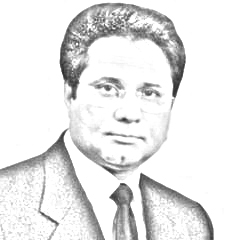The fiscal woes of Pakistan are due to the naked defiance of the rich to pay due taxes on their enormous incomes/wealth. A progressive tax (Income Support Levy), legislated in 2013, remains unpaid till today by 99 parliamentarians and rich Pakistanis. The Federal Board of Revenue (FBR) has failed to collect it from the defaulters — many of whom are criticizing the government of Pakistan Tehreek-i-Insaf (PTI) for going to the International Monetary Fund (IMF) against its vowed policy. Rich businessmen, who are seeking more ‘concessions’ from PTI government, by not paying Income Support Levy, meant for helping the economically distressed persons/families, proved their apathy and callousness. However, this progressive tax was abolished in 2014, and in 2017-18 Pakistan suffered a record of fiscal deficit of Rs. 2.3 trillion forcing the PTI government to borrow funds just to pay old debts!
Parliamentarians enjoying exclusive power to levy taxes under Article 77 of the Constitution almost en bloc did not pay the tax they themselves imposed; this is the height of indignity and disgrace. This needs to be debated publically, the Supreme Court should also take suo moto action in the light of Article 62 and 63 of the Constitution against lawmakers who did not pay due taxes. People ask that if the mighty sections do not pay taxes, then why should they suffer on account of the harsh conditions of the IMF hurting them and not the rich.
The yoke of IMF and debt enslavement are not merely economic issues. ‘Debtocracy’, a term yet to become part of public discourse, has far-reaching ramifications; a nation in a ‘debt prison’ automatically suffers political subjugation. Thus, it is not surprising that IMF, in which the United States is the main shareholder, for negotiating a fresh bailout, is asking Pakistan for reduction in the share of provinces from the National Finance Commission Award (disturbing the federal-provincial harmony achieved after the 18th Constitutional Amendment), and revealing complete details of terms and conditions for all loans/debts owed to China (which is an attack on CPEC by the US through IMF as its economic hitman).
If a lender exploits a debtor and imposes conditions, it is considered justified as per the age-old adage: beggars can’t be choosers. This axiom aptly applies to Pakistan. Every government acts upon the advice of our infamous ‘revenuec racy’ (addicted to the easy collection of indirect taxes and fond of favouring the rich through exemptions/amnesties/immunities/waivers) and lands in trouble. ‘Revenuecracy’ and donor-fed technocrats keep on singing the mantra of ‘more taxes’ and improving the ‘tax-to-GDP’ ratio but never talk about the incontrovertible fact that Pakistan is amongst the most heavily-taxed nations in Asia. However, the Income Support Levy meant for providing financial resources for an income support fund for the economically distressed citizens was not paid by the rich and was then abolished abruptly. This tax was payable along with a wealth statement that was made mandatory for all persons for the tax year 2013, but unlawful relaxation was given to the rich to avoid this tax through an amendment in the Income Tax Ordinance, 2001.
The Income Support Levy meant for providing financial resources for an income support fund for the economically distressed citizens was not paid by the rich and was then abolished abruptly. This tax was payable along with a wealth statement that was made mandatory for all persons for the tax year 2013, but unlawful relaxation was given to the rich to avoid this tax through an amendment in the Income Tax Ordinance, 2001
According to the Parliamentarian Tax Directory for Year Ended 2013, released by the Federal Board of Revenue (FBR) on February 28, 2014, out of 1172 parliamentarians (senators and members of national and provincial assemblies) hardly 10 members paid Income Support levy.
Shockingly, a tax meant for the poor was not paid by 1160 parliamentarians, including the incumbent Prime Minister and the Finance Minister. Ishaq Dar, while proposing Income Support Levy in his Budget Speech in 2013, said:
It is incumbent on all of us who are blessed with exceptional favours from Allah (SWT) to contribute to the welfare of those not so fortunate. Many of us who may have earned our assets while working abroad have negligible tax liabilities under the existing laws and double taxation treaties. Yet we must share the burden of helping our weaker segments of population. In order to mobilize additional resources for enhancing the income support program for the poorest families in Pakistan, we have proposed to impose a small levy on such persons. This levy shall apply on net moveable assets of persons on a given date of 0.5 percent. The receipts under this head will be credited to the income support program of the government… Let me admit that I shall be amongst the first ones who will be hit by this levy. According to my estimation, I will have to pay an additional Rs 2.5 million on this count this year, but I will be happy to make this contribution for the welfare of our poor people”.
However, Ishaq Dar in his budget speech of 2014, withdrew Income Support Levy on the pretext that his rich colleagues in the House and friends in business “did not accept this measure”. FBR did not even bother to recover it for 2013. Of course, IMF and other donors will not ask the government why the rich successfully managed to escape the payment of a progressive tax. They, in fact, like the governments that do not bring fundamental structural reforms in the existing tax system, burden the poor and ensure that dependence on them continues unabated. It is evident from the fact that despite taking loans and grants of billions of dollars since 1960, the successive governments have failed to generate required resources through sustainable and an equitable economic growth to eliminate fiscal deficit and alleviate poverty.
The writer, Advocate Supreme Court, is Adjunct Faculty at LUMS. Email: ikram@huzaimaikram.com; Twitter: @drikramulhaq
Published in Daily Times, October 21st 2018.
